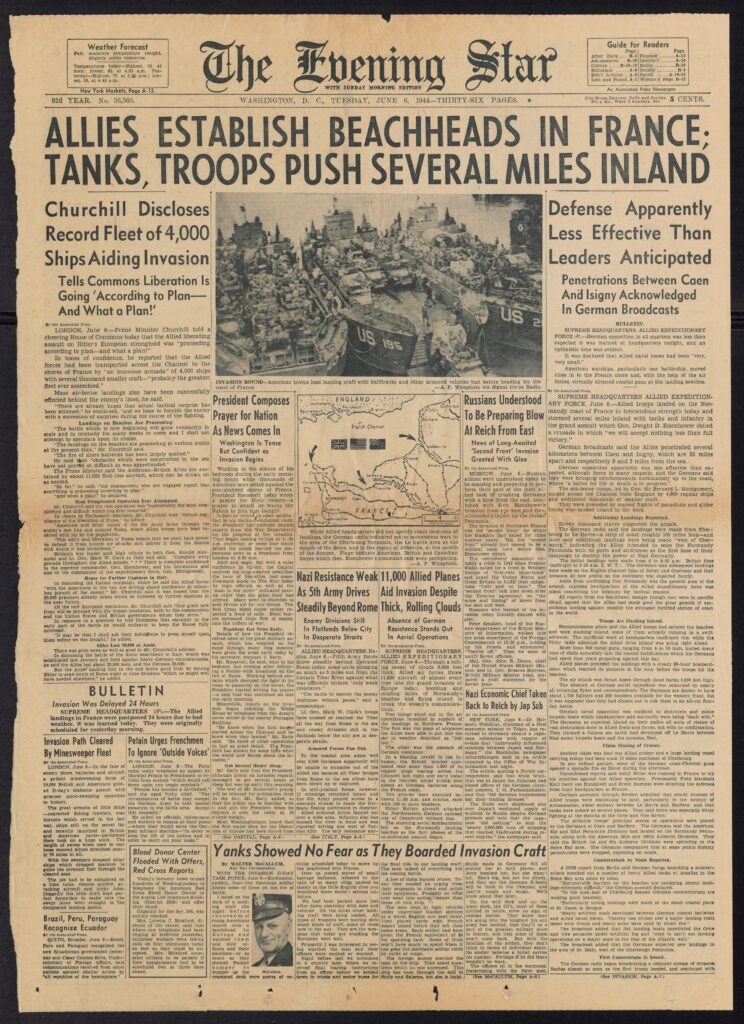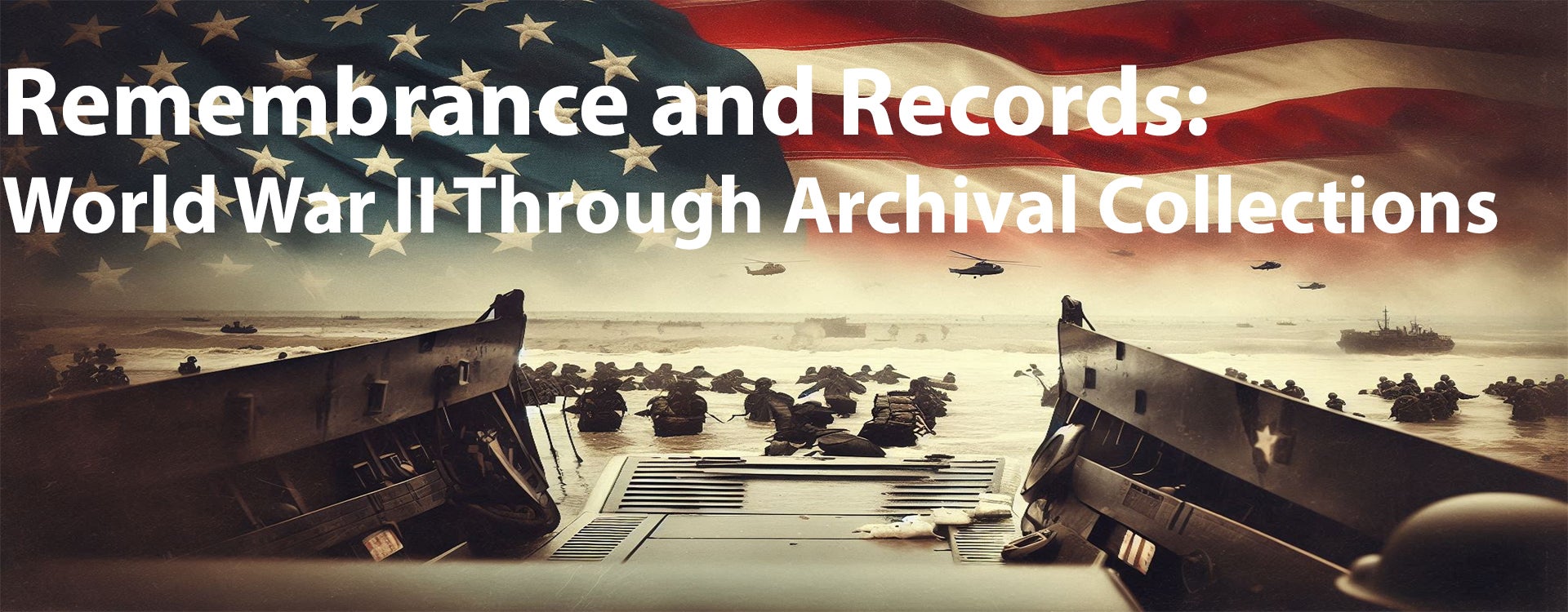Operation Overlord, June 6, 1944
Remembrance and Records: World War II Through Archival Collections
Over the next year, in commemoration of the 80th anniversary of the end of World War II, Library Special Collections will be highlighting items from the East Carolina Manuscripts Collection that relate to the conflict and the individuals who served.
D-Day: June 6, 1944
On June 6, 1944, over 3 million Allied troops from the United States, Great Britain, Canada, and several other nations executed a daring assault against heavily fortified German positions along the Normandy coast. The Normandy invasion, codenamed Operation Overlord, was the culmination of meticulous planning, coordination, and bravery on an unprecedented scale. The beaches of Omaha, Utah, Gold, Juno, and Sword became the site of the largest amphibious invasion in history, marking the beginning of the end of World War II in Europe. As we commemorate the 80th anniversary of D-Day, it’s crucial to reflect on the profound impact and lasting legacy of this pivotal moment in history.
The success of D-Day was not guaranteed. The Allied troops faced formidable challenges, including fierce resistance from German forces, treacherous terrain, and unpredictable weather conditions. Yet, through unwavering determination and sheer grit, they managed to establish a foothold on the French coastline. The sacrifices made on that fateful day were immeasurable, with thousands of brave soldiers paying the ultimate price for freedom.
The invasion began early on the morning of June 6, 1944, with paratroopers being dropped behind enemy lines. Later that morning, troops began landing on the beaches of Normandy. The beaches were heavily fortified by the Germans, and the Allied soldiers faced fierce resistance. However, they were eventually able to secure a foothold on French soil.
The battle for Normandy was long and bloody. It took two months for the Allies to break out of the beachhead and begin their advance towards Germany. However, the success of D-Day marked a turning point in the war. The Germans were now fighting on two fronts, as the Soviet Union was also advancing from the east.
The Evening Star

The front-page of the June 6, 1944 The Evening Star newspaper announcing the landing of Allied forces on the beaches of Normandy, France. Item from U.S. Navy Memorial Foundation Collection: Miscellaneous Papers (#677.058), East Carolina Manuscript Collection, J. Y. Joyner Library, East Carolina University, Greenville, North Carolina, USA.
The uncertainty and chaos of D-Day are perfectly captured in the front-page headline of the June 6, 1994 issue of The Evening Star. Found in the U.S. Navy Memorial Foundation Collection: Miscellaneous Papers (Manuscript Collection #0677-058), this newspaper would have been just one of many that people read to learn about the Normandy Invasion. While papers such as The Evening Star reported on Operation Overlord at the time, it was still too early to know whether the invasion would end up being successful. This is perhaps best represented by a front-page article where British Prime Minister Winston Churchill is quoted as saying that the operation was going “according to plan.” But as the reporter pointed out, the battle was just beginning.
Another noteworthy headline from this issue includes how American President Franklin D. Roosevelt composed a prayer for those involved in the invasion and that he would be reciting it at 10:00 pm that evening during one of his famed “Fireside Chats.” Included are also stories about the Nazi’s fortification and defense of the French coastline, the morale of the American troops as they departed to cross the English Channel, and an interesting short bulletin that announced the planned invasion had been delayed 24 hours due to unfavorable weather.
Newspapers such as The Evening Star and other media outlets of the time were crucial as they not only informed citizens around the world on the war’s progress but also kept those not serving on the front lines connected to the fight and their loved ones abroad.
The Impact and Legacy of Operation Overlord
The impact of the Normandy invasion reverberated far beyond the beaches of France. It dealt a severe blow to Nazi Germany’s grip on Western Europe, paving the way for the liberation of occupied territories and the eventual defeat of the Axis powers. D-Day marked a turning point in the war, shifting the momentum in favor of the Allies and hastening the downfall of Adolf Hitler and Nazi Germany.
Moreover, the Normandy invasion embodied the spirit of international cooperation and unity in the face of adversity. It showcased the power of collective action and solidarity among nations with a shared commitment to justice and liberty. The Allied forces, representing diverse cultures and backgrounds, stood shoulder to shoulder in the fight against tyranny, demonstrating the strength of unity in the pursuit of a common goal. The legacy of D-Day endures as a symbol of courage, sacrifice, and resilience. It serves as a reminder of the profound human cost of war and the importance of upholding the values of freedom, democracy, and human rights.
As we commemorate the 80th anniversary of D-Day, let us honor the memory of those who made the ultimate sacrifice. May we never forget the valor and bravery displayed on the shores of Normandy on June 6, 1944.
Visit the Ship’s Log as well as Joyner Library social media channels to learn more about materials related to World War II that are a part of the East Carolina Manuscripts Collection’s holdings. Joyner Library Special Collections will be displaying an exhibit of items and individual stories related to World War II during the summer and fall of 2025.
